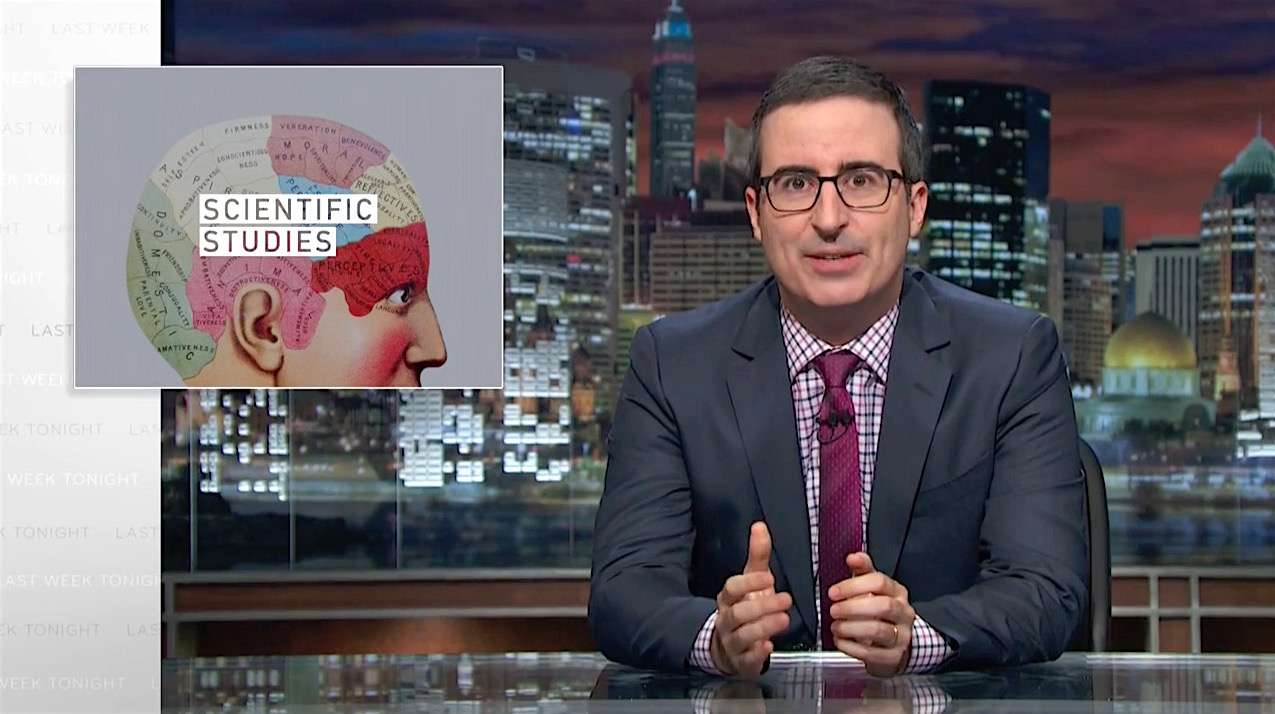John Oliver stands up for science, pours cold water on all those scientific studies you love


A free daily email with the biggest news stories of the day – and the best features from TheWeek.com
You are now subscribed
Your newsletter sign-up was successful
"Science is constantly producing new studies, as you would know if you ever watched TV," John Oliver said on Sunday's Last Week Tonight. "And when studies aren't blanketing TV, they're all over your Facebook feed." If you love science, you'll love Oliver's segment; if you love news recaps of scientific studies, well, he wants you to be a more skeptical news consumer.
"There are now so many studies being thrown around, they can seem to contradict one another," Oliver said, citing coffee as an example. "And after a certain point, all that ridiculous information can make you wonder: Is science bullshit? To which the answer is clearly 'no,' but there is currently a lot of bullshit masquerading as science." For the next 15 minutes, he walked through some of the reasons, from the lack of replication studies to confirm initial research — "There is no reward for being the second person to discover something in science," he said. "There's no Nobel Price for fact-checking" — to the way scientific journals and organizations describe findings in news releases, which are then simplified even more on TV morning talk shows. "It's like a game of telephone — the substance gets distorted at every step."
The media isn't the only culprit. "There's no doubt, some of this is on us, the viewing audience," he said, placing himself with news consumers, not people with HBO talk shows. "We love fun, pop-y science that we can share like gossip, and TV news producers know it." Oliver made a final plea: "Science is, by its nature, imperfect, but it is hugely important. And it deserves better than to be twisted out of proportion and turned into morning show gossip." And then he threw up his hands and gave people what they want (with some snark): TODD talks, a dumbed-down version of TED talks with the tagline "because science does not have to be an exact science." Watch below. Peter Weber
The Week
Escape your echo chamber. Get the facts behind the news, plus analysis from multiple perspectives.

Sign up for The Week's Free Newsletters
From our morning news briefing to a weekly Good News Newsletter, get the best of The Week delivered directly to your inbox.
From our morning news briefing to a weekly Good News Newsletter, get the best of The Week delivered directly to your inbox.

A free daily email with the biggest news stories of the day – and the best features from TheWeek.com
Peter has worked as a news and culture writer and editor at The Week since the site's launch in 2008. He covers politics, world affairs, religion and cultural currents. His journalism career began as a copy editor at a financial newswire and has included editorial positions at The New York Times Magazine, Facts on File, and Oregon State University.
-
 The Olympic timekeepers keeping the Games on track
The Olympic timekeepers keeping the Games on trackUnder the Radar Swiss watchmaking giant Omega has been at the finish line of every Olympic Games for nearly 100 years
-
 Will increasing tensions with Iran boil over into war?
Will increasing tensions with Iran boil over into war?Today’s Big Question President Donald Trump has recently been threatening the country
-
 Corruption: The spy sheikh and the president
Corruption: The spy sheikh and the presidentFeature Trump is at the center of another scandal
-
 ‘One Battle After Another’ wins Critics Choice honors
‘One Battle After Another’ wins Critics Choice honorsSpeed Read Paul Thomas Anderson’s latest film, which stars Leonardo DiCaprio, won best picture at the 31st Critics Choice Awards
-
 A peek inside Europe’s luxury new sleeper bus
A peek inside Europe’s luxury new sleeper busThe Week Recommends Overnight service with stops across Switzerland and the Netherlands promises a comfortable no-fly adventure
-
 Son arrested over killing of Rob and Michele Reiner
Son arrested over killing of Rob and Michele ReinerSpeed Read Nick, the 32-year-old son of Hollywood director Rob Reiner, has been booked for the murder of his parents
-
 Rob Reiner, wife dead in ‘apparent homicide’
Rob Reiner, wife dead in ‘apparent homicide’speed read The Reiners, found in their Los Angeles home, ‘had injuries consistent with being stabbed’
-
 Hungary’s Krasznahorkai wins Nobel for literature
Hungary’s Krasznahorkai wins Nobel for literatureSpeed Read László Krasznahorkai is the author of acclaimed novels like ‘The Melancholy of Resistance’ and ‘Satantango’
-
 Primatologist Jane Goodall dies at 91
Primatologist Jane Goodall dies at 91Speed Read She rose to fame following her groundbreaking field research with chimpanzees
-
 Florida erases rainbow crosswalk at Pulse nightclub
Florida erases rainbow crosswalk at Pulse nightclubSpeed Read The colorful crosswalk was outside the former LGBTQ nightclub where 49 people were killed in a 2016 shooting
-
 Trump says Smithsonian too focused on slavery's ills
Trump says Smithsonian too focused on slavery's illsSpeed Read The president would prefer the museum to highlight 'success,' 'brightness' and 'the future'
